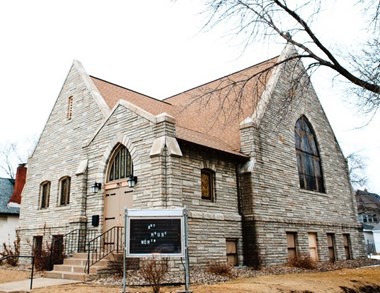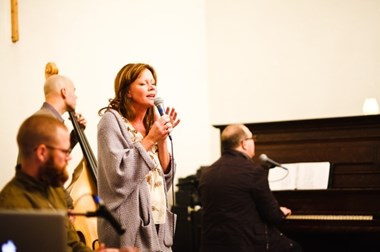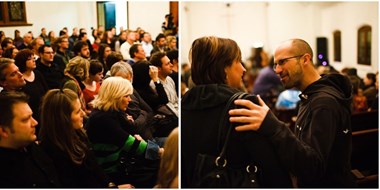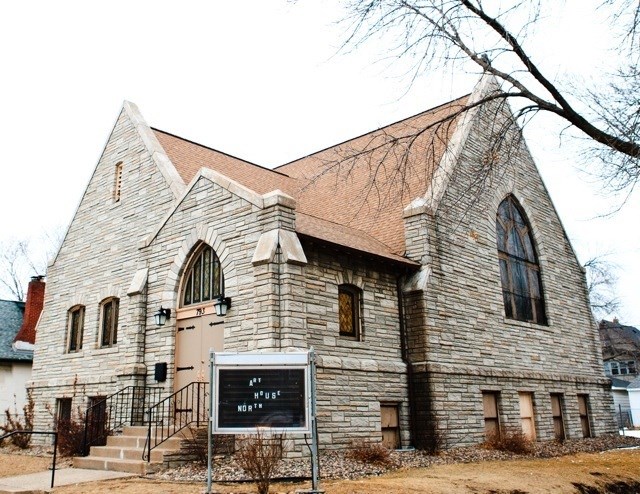Sara Groves' Art House North
When Sara Groves moved her family of five from the suburbs of Minneapolis to a historic neighborhood in St. Paul, Minnesota, it wasn't without hints of doubt and hesitation. The Grammy-award winning artist had just renovated her home of eight years when she suddenly felt led to settle into a formerly foreclosed home on Armstrong Street to bring hope, art, and exploration to the city.
"God just pointed and said, 'I've got a plan for this corner in St. Paul, Minnesota,'" Sara says. "Even though I've gone through all kinds of ups and downs—even depression—in this move, if I ask myself, Am I supposed to be here?, the answer is resoundingly, yes, I know I'm supposed to be here. I thank God for that. Without that, it would be very difficult."
The Groves moved into a formerly foreclosed home down the street from an old church building where they welcome guest speakers, artists, and performers to talk and explore questions of faith in community.
"I believe the gospel is capable of squaring off with every dark corner and piece of bad news we hear," Sara says. "You can preach about something, but someone in song or dance can interpret something, and the floodgates of your heart break open."
Art House North opened in January 2012, and has hosted exhibits, creative artists, and performers from a variety of organizations. Sara has a heart for raising a voice for the voiceless, and the Art House North plays a role in fostering creative community for artists in St. Paul.
Describe Art House North—what does it mean to provide and foster "creative community for the common good?"
Our big question is, how do we serve artists in our community in St. Paul, to strengthen them and challenge them and come together to do worldview work? That's where every one of our events starts.

Photo courtesy Justin Vagle
The church helps people embrace doubt and questions, but art has to do with the journey. Dallas Willard said that doubt is a bucket for God to speak, to fill with answers. You can't reach any place of revelation without first asking a question. A lot of art is asking questions. So to me, artistic expression is important—it is counter to the certainty we crave. We want to be able to say black and white—this is this, this is that. Not to say that there aren't absolute truths, because there are, but within that framework, even Jesus often answered a question with a question. That is what art does a lot of times.
What's been your favorite event at the Art House North so far?
In January, after Sandy Hook, Makoto Fujimura, founder of the International Arts Movement in New York City, wrote a blog about the tragedy as a bugle call to the artist: What will you put into the world?
I could not get my head around the tragedy. I was mourning and grieving it. At church we prayed, but it felt like we visited it and then we moved on. My husband Troy and I decided to invite five artists to the Art House North for an event to respond to the tragedy: a dancer in our community, a girl who was in theater, a poet and teacher at a local university, a songwriter, and a cellist. I didn't give them a lot of information other than, will you just respond to it? We called it "Artists Respond to Tragedy."
We had a full house, and there were moments of grieving, elation, and great hope. I put in the piece from Makoto, then my friend who's in theater did a solo performance of a piece about the human spirit, called "I Am Anne Frank." It was beautiful. My other friend brought girls that had just been dancing with her at her theater, and they did a dance to the civil rights and gospel song, "Walk with Me, Lord." It started out very slow and somber, and we were all on our feet clapping at the end. There was no dry eye in the place. The whole thing was incredible and came out of a place of Troy and I asking ourselves, what do we need? I decided I really needed to do this. That's where it came from.

Other nights are evenings of conversation. Andy Crouch came this summer, and we were able to listen to music, contemplate art, and reflect on how the artist reflects the different aspects of a triune God.
The hope is that artists leave feeling that their faith matters to the integration of their work—that it's not a separate piece. In every aspect of our life, we integrate our faith. That doesn't mean we always wrap up everything with a bow—it means we're constantly thinking about our faith and the light we shine on our work as artists regardless of the mystery or questions we're left with. The hope is that we want to gather with people and do worldview work that matters.
What inspired you to start hosting events at Art House North?
Our model is the Art House in Nashville, a 100-year old renovated church where two creative artists, Charlie Peacock and Andi Ashworth, are constantly producing music and hosting events with interesting people.

There's no sort of business model for Art House North— we see it as an extension of our home, our living room down the street. That's what makes it sustainable for Troy and me. When I first saw the building, I had this vision: the building had been abandoned and misused, and needed a lot of TLC. The basement windows were boarded up, but I felt there was going to be a glow from that building, a spiritual glow and cared-for type of atmosphere, and a sense of hospitality. That's where we're headed now. We just put the new windows in last month.
You work closely with International Justice Mission. How has their work changed the way you approach music and ministry?
Involvement with IJM changed everything for me. I had been exposed to all sorts of ministries in my life, but my heart started ringing like a bell when I heard about the work IJM does of freeing victims of trafficking around the world. That's how the Holy Spirit works in our lives. We have a readiness for something, and when that thing comes, we feel that, oh my word, this is what I was made to do. I feel that way about IJM. Advocacy has been very life-giving for me. It changed the gospel for me. I haven't read the Bible the same way since.
All of a sudden, I saw Jesus come out of the desert after 40 days. This is a pivotal moment. These are the very first words out of his mouth in the very beginning of his ministry: He says, "For the spirit of the sovereign Lord is upon me, to bind up the brokenhearted and preach freedom from the captives release for the prisoners, good news to the poor" (Luke 4:18). He's not just talking about spiritual poverty. Jesus is addressing needs of the flesh.
As a mom, it's hard to take in information about human trafficking. It's painful and overwhelming. It creates a lot of fear, so I've been able to write songs about my own fear. I wrote a whole record about my entrance into this world of advocacy, and I can't tell you—the power of advocacy and education is immense. I can't go everywhere and do everything, but I will go to an event if I can. When you're actually out there doing stuff, attempting to share your faith in a way that's meaningful and has real-world traction, you find yourself in these situations saying, "What do I do now? I'm in over my head!" Not in a bad sense of taking on more than God asks you to, but by putting yourself in places that challenge you, that create a need to read the Word.
That vibrant walk with the Holy Spirit is what I long for more of in myself. Call it revival, call it whatever you want— it's that vibrancy and that reality of daily consult where we're in great need of him daily.
Subscribe to TCW's free email newsletter at this link for weekly updates and chances to win free books and music downloads.
Sara Groves is a Grammy-award winning recording artist. Connect with her online on her website.
Photos courtesy Justin Vagle.
Read more articles that highlight writing by Christian women at ChristianityToday.com/Women
 Read These Next
Read These Next

 What a Wonderful WorldHow science leads us toward—not away from—our Creator
What a Wonderful WorldHow science leads us toward—not away from—our Creator Downton Abbey, My Marriage, and MeWhat the popular television series is teaching me about the values of marriage and community.
Downton Abbey, My Marriage, and MeWhat the popular television series is teaching me about the values of marriage and community.









 Homepage
Homepage



